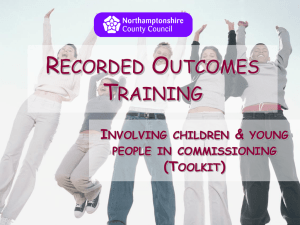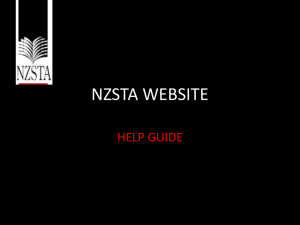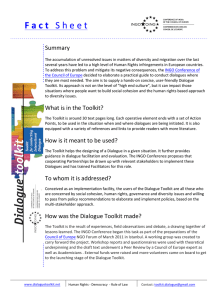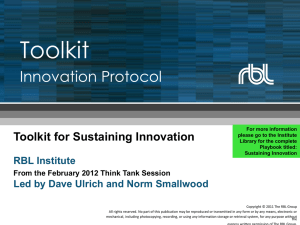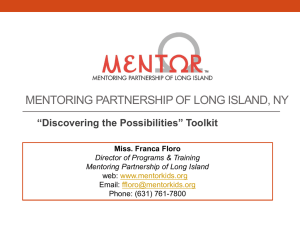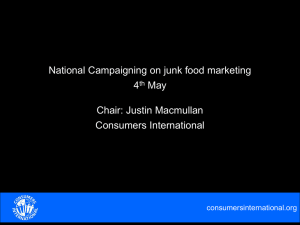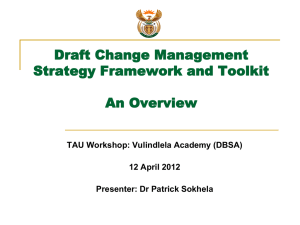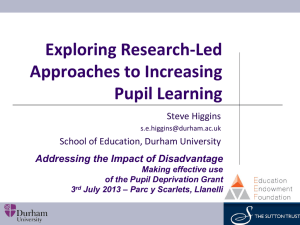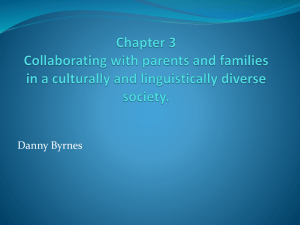Mothers` Mental Health Toolkit - BC Association of Pregnancy
advertisement
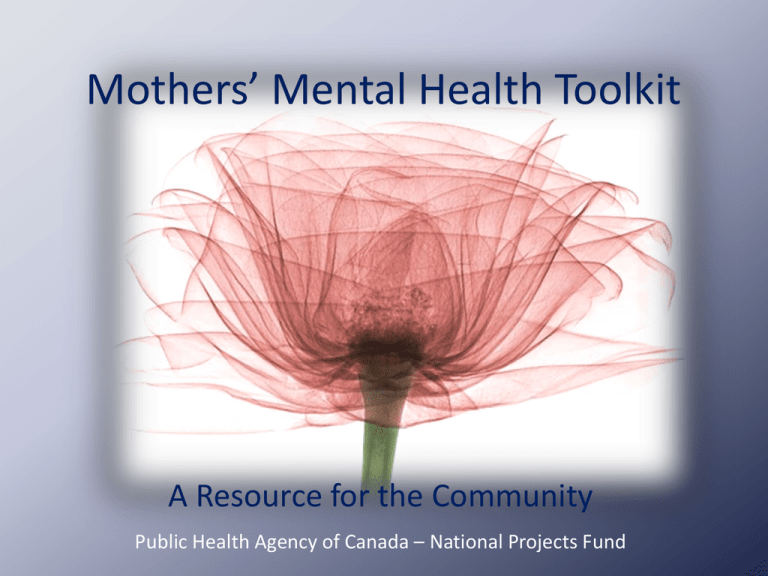
Mothers’ Mental Health Toolkit
A Resource for the Community
Public Health Agency of Canada – National Projects Fund
Agenda for today
•
•
•
•
•
•
•
•
•
Welcome and Introductions
Activity #1
Introduction to the Toolkit
What’s inside and chapters of this Toolkit
Lunch
Practice using the Toolkit with Case Scenarios
Activity #2
Video
Closing and Goodbye’s
Introductions
• Please tell us your name and where you work.
• Share what inspires you in your interactions
with the clients you work with.
A Look at Mental Illness…
If you are experiencing an ear ache…
– What might your symptoms be?
– Who might you tell?
– When might you seek help?
If you are experiencing depression…
– What might your symptoms be?
– Who might you tell?
– When might you seek help?
Mental Health Issues
• Mental illness is a mental/behavioral pattern
or anomaly that causes either suffering or an
impaired ability to function.
• Biological, Psychological and Social factors
contribute to mental illness.
• Mental health can be seen on a continuum:
Healthy
Reacting
Injured
Illness
Maternal Mental Health Problems
• Mental Health Diagnosis Pre-Pregnancy
• New Mental Health Problem During Pregnancy or First
Year After Birth
• Severe Adjustment Difficulties
• Personality Disorders
• Post-Traumatic Stress Disorder Spectrum
• Concurrent Addictions
• Attachment Disturbances
• Complex Case/High Risk Contributors
• Disorders listed and defined in the
Toolkit (pg 122-130)
Mothers’ Mental Health Toolkit
•
Public resource for community service providers and
families for education, advocacy, and treatment support for
mothers with mental health problems.
•
Developed by Dr. Joanne MacDonald (Psychiatrist, Project
Lead) and Colleen Flynn , MSW RSW (Clinical Therapist,
Content Lead) of Reproductive Mental Health Service, IWK
Health Services in Halifax, Nova Scotia
• Revised and training developed for CAPC and CPNP
programs through funding from National Projects Fund by the
Public Health Agency of Canada.
Toolkit Project Values:
•
•
•
•
•
•
•
•
Health Promoting
Mental Health Literacy
Community Informed
Family Centered
Strengths Based
Support Enhancing
Knowledge Sharing
Collaborative Care & Intervention
What makes a women vulnerable
for Maternal Mental Health
Problems
Vulnerability & Risk Determinants
•
•
•
•
•
•
•
•
•
•
Poverty
Low level of support / isolation
Family conflict/disruption
Trauma
Poor Housing
Transportation limitations
Education deficits
Unemployment
Previous Mental Health Problems
Family History of Mental Illness/Addictions
Promoting Mothers’ Mental Health
• Well Mother
• Healthy Child
• Strong Community
Mother’s Mental Health is critical to
Infant Attachment and Development
Infant Attachment & Development
Contributes to Risk of Child Mental
Illness and Behaviour Problems
Mothers’ Mental Health Toolkit
What’s Inside?
• Maternal Mental Health Education for Community
Service Providers (long sidebars)
• Worksheets for Use with Mothers (short sidebars)
• Wellness to Illness Recognition
• Resources for Mothers and their Caregivers
What isn’t in the toolkit?
• Depth of Diversity Applications
• Cultural Specificity
• Mental Health Treatment or Intervention
• Limited Rural/Remote Tools
• Languages Other than English/French
• Replacements for
Mental Health Services
Chapters of the Toolkit
•
•
•
•
•
•
•
Ch. 1
Ch. 2
Ch. 3
Ch. 4
Ch. 5
Ch. 6
Ch. 7
Mothers’ Wellness and Self-Care
The Mothering Role
Understanding Mother’s Mental Health
Assessment and Screening
Intervention and Treatments
Supporting Recovery
Community Action
Chapter 1 – Mothers’ Wellness and Self Care
The toolkit begins with a chapter on wellness
that was designed for use by the mother.
Topics in this chapter include:
• Body Health
– Nutrition, fitness and sleep
• Mental Health
– Relaxation and stress management
• Emotional Health
– Substance use and Self Development
Examples of Worksheets
Self-Care Checklist
Your Body Health is Important
Food and Feelings Diary
My Exercise Ideas
Worksheets and Information sheets on
Stress Management and Relaxation Practices
More Worksheets for Mothers
Exploring My Substance Use
Substance Use Checklist
Balancing Needs and Saving Energy
What Kind of Person Can I Become
Chapter 2 – The Mothering Role
Chapter 2 looks at the changes a women might feel
becoming a new mother and her support system.
Topics in this chapter include:
• Definitions/realities of motherhood
• Attachment development
• Building social supports
• Emotional coping strategies
• Relationship health
• Parenting
Examples of Worksheets
The Many Hats of Motherhood
Common Thoughts About Motherhood
Helping Ourselves to Calm and Relax
Connections That Count
Your Partner Relationship
It Takes a Village (Living with Parents)
Examples of Information Sheets
Attachment Development
Building a Strong Bond with Your Baby
Emotional Coping Strategies
Tiny Baby, Big Changes
Strategies for Positive Communication
Parenting Through Depression
Examples of Checklists and Tips
Do What Helps Us Parent
Top 10 Tips for a Partner / Co-Parent
Tips for Helping: Providing Support to a Vulnerable Mother
Child Outcomes: How Do You Know Your Child has Good Mental Health
Chapter 3 – Understanding Mothers’
Mental Health
Chapter 3 considers the Dimensions of Health
and Wellness in body, thoughts and feelings.
This chapter has more sections dedicated to
the service provider than in previous chapters
and begins to look at mental illness including:
• Causes and Contributions
• Signs and Symptoms
• Diagnostic Possibilities
Information sheets for service providers including:
Mental Health, Family Violence, Risk Factors for
Illness, and Determinants of Progress or Outcome.
Worksheets for mothers including: Abuse and Safety
Planning, Power and Control Wheels, and Risk Factors for
Pregnancy or Postpartum Mental Health Problems.
Causes and Contributions, Signs and Symptoms,
and Diagnostic Possibilities
{Note: The information given is not to be used to diagnose clients.}
Chapter 4 – Assessment and Screening
Chapter 4 has information on Developing
Cultural Awareness and Competency and tips
for working with Newcomers. You will also
find:
• Perinatal Mental Health Assessment
• Postpartum checklist
• Edinburgh Postnatal
Depression Scale
Chapter 5 – Intervention and Treatments
Chapter 5 is dedicated to the service provider and
offers information on General Interventions,
Therapy Principles, and Medications.
{This information is not meant to replace medical interventions; it is
given to assist supporting service providers with knowledge.}
Increased knowledge among service providers of mental health
issues, diagnoses, and treatments helps to reduce stigma and
encourage women toward valuing their wellness and seeking
recovery from illness.
Chapter 6 – Supporting Recovery
This chapter has many worksheets for the
mother that can assist her in moving forward
with goal planning and healthy thinking.
In addition to these worksheets, this chapter offers:
Connecting to Mental Health Services
Involvement with the Department of Community Services
If Your Children Have Been Taken Out of Your Care
Chapter 7 – Community Action
Chapter 7 was designed for the Service Provider with a list of ideas and
suggestions for collaborative mental health care as well as examples of
initiatives underway already working well.
Importance of Front Line Staff
Learning about Mental Illness
Mental Health For All, By All
Now let’s see what the Toolkit has for you…
• Break into small groups
• Review the case study
• Answer the questions together as a group
• Share what your
group discussed with
everyone else
Case Study #1 - Samira
1. Provide a brief description of the mother, history,
problems (whatever you want to bring out).
2. What are some possible challenges/issues that she might
be facing?
3. What would you like to know more about working with
this mother?
4. What could be the role for you or your organization in the
mental health of this mother?
5. How might you use the Toolkit Resource with this mom?
Case Study #2 - Julie
1. Provide a brief description of the mother, history,
problems (whatever you want to bring out).
2. What are some possible challenges/issues that she might
be facing?
3. What would you like to know more about working with
this mother?
4. What could be the role for you or your organization in the
mental health of this mother?
5. How might you use the Toolkit Resource with this mom?
Case Study #3 - Kerry
1. Provide a brief description of the mother, history,
problems (whatever you want to bring out).
2. What are some possible challenges/issues that she might
be facing?
3. What would you like to know more about working with
this mother?
4. What could be the role for you or your organization in the
mental health of this mother?
5. How might you use the Toolkit Resource with this mom?
Think of a secret that you have…
The Real World We Live In
Closing and Goodbye
• Go around the room and say what your
thoughts are on the toolkit.
• What did you like about it most?
• Do you have any questions?
• Evaluations on the table, please fill one out.
